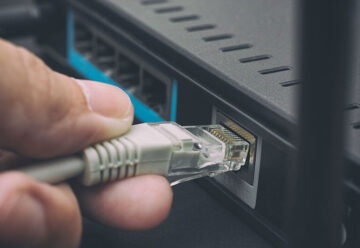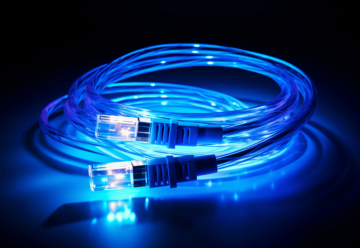A business connectivity provider arranges, manages and supports the network connectivity requirements of businesses. This can include monitoring and maintaining your internet, communications and networking services, ensuring you enjoy higher uptime and greater performance than you could achieve on your own.
Neos Networks has over 20 years of experience as a network connectivity provider, delivering efficiencies, reducing costs and improving network security.
What are your connectivity options in the UK?
An internet connectivity provider will offer a range of technologies to connect its customers to a network. The most common technology types are:
- Digital Subscriber Line (DSL)
- Cable broadband
- Fibre optic broadband
- Wireless broadband
- Satellite and mobile broadband
- Dedicated leased line
While the above are all great services, if you’re looking for stronger SLAs, higher capacities, and better security, then you need to broaden your search, instead focusing on business-specific connectivity options.
Let’s explore some of the business-focused solutions that a managed connectivity provider can deliver.
Business Ethernet services
Ethernet is the most common type of business connectivity service used in the UK today. It provides a fibre connection that runs directly to your premises. Our business Ethernet service satisfies all customer bandwidth requirements from 10Mbps all the way up to 10Gbps, with packages that span a wide range of service options and price points.
Dedicated Internet Access (DIA) services
A DIA network is a private connection between your premises and your Internet Service Provider (ISP). The bandwidth you purchase is solely for use by your organisation. That means you won’t have to share your bandwidth with other users or worry about having your connection slowed by competing traffic.
Managed Wide Area Networking (WAN) services
Managed WAN services can either be based on IP-VPN or SD-WAN technologies.
An IP-VPN (Internet Protocol Virtual Private Network) is commonly used for connecting organisations with multiple sites or offices, providing resilient and efficient network traffic flow. It delivers a secure private network without the cost of building one.
SD-WAN (Software Defined Wide Area Network) is a newer alternative, delivering a similar solution, but bringing together different traditional WAN technologies to create a single, seamless view of the network.
Dark Fibre services
A Dark Fibre connection is an unlit fibre optic network. This means it doesn’t have a service running on it. Unlike Ethernet or DIA services, if you purchase a Dark Fibre solution, you will also need to deploy and manage the equipment needed to light it. That being said, for larger-scale businesses looking for near-limitless capacity and maximum security, Dark Fibre is well suited.
The examples above are just some of the many connectivity options available to your business.
What should you consider when choosing a network provider?
When choosing a network provider, there are some fundamental factors that you need to take into account.
1. Network speed
Everything moves fast in today’s ultra-connected business world, and your organisation needs to keep up. You should engage with a supplier that can offer low latency, high bandwidth solutions, delivered through its own network.
2. Network security
As global cybersecurity threats continue to escalate, with malicious actors intent on damaging and stealing data, and holding organisations to ransom, your connectivity provider’s security services need to be world-class.
3. Network reach
Regardless of the speed and security, if the network doesn’t cover all your business and customer locations, then you could be in trouble. For maximum speed and efficiency, your managed connectivity provider needs to be able to host your data as close as possible to where it’s needed.
4. Customer service
You need a provider who will answer all your questions, overcome any hurdles and generally smooth the way to your new service. Net Promotor Score (NPS) is a great barometer for customer service. Make sure your chosen provider has a positive NPS score and invests in customer satisfaction.
5. Cloud options
Migrating your systems to the cloud is not a fire-and-forget project. It will constantly evolve. You’ll be better prepared for the long run if your chosen managed connectivity provider has a wide portfolio of options, futureproofing your online strategy.
6. Reputation
Begin with the basics. Ensure your chosen provider has a long and successful track record, which needs to be counterbalanced by an innovative and future-facing approach. Find out who their clients are, as well as their partners. You should also ask about their environmental, social and corporate governance practices.
What bandwidth do I need for my business?
The more bandwidth your internet connection has, the more data you can have move through it at any given time. The amount you need depends on what your connection will be used for, and how many people will be using it. The table below provides you with a rough guide, although every business has different needs.
| Number of users | Tasks | Speed required |
| 3 to 5 | Sharing files, business communications and basic business WiFi use | 25Mbps |
| 6 to 10 | Video streaming, financial transactions and frequent file sharing | 75Mbps |
| 11 to 20 | Content streaming, conferencing and hosting | 250Mbps |
| 21 to 35 | Multiple servers, bandwidth-intensive backups and applications based in the cloud | 500Mbps |
| 35 to 50 | Technology-led multimedia communications, with mission-critical online systems | 1Gbps+ |
| 50 to 99 | 2Gbps+ | |
| 100+ | 3Gbps+ and highly dependent on the nature and needs of the business |
What does a good network connection cost?
It shouldn’t all come down to cost, and it often doesn’t. Particularly when strategic decisions that will have a major impact on the future of a company are concerned. However, any solution needs to add value, and the cost should reflect that.
There is a wide range of factors affecting the price of connectivity solutions. These include location, contractual commitments, SLAs, and the type and speed of connection. With so many variables, it’s worth getting a few quotes, but make sure they are like-for-like. Also, take into consideration all the other elements covered above, such as security, customer service, reach and reputation.
You can use our LIVEQUOTE pricing tool to compare connectivity services across the UK on a range of capacities from 10Mbps all the way up to 10Gbps.
What are the benefits of choosing Neos Networks for your connectivity solutions?
We are renowned for offering high capacity, robust, reliable connectivity across the UK, thanks to our 34,000km data centre and exchange network. As part of our ongoing promise to continually expand, we now have 90 on-net data centres and 550 exchanges on our network. Combine all this with our extensive product and service portfolio, and we command an enviable market position.
But it’s not just about the tech, the competitive advantage and the coverage. We believe in the personal touch. From your initial enquiry, to signing the contract and beyond, you’ll be in the safest hands. And with one dedicated point of contact, we’ll get to know everything about your company, and exactly how we can support it to provide the best possible outcome, every time.
If you’re looking for further guidance on selecting an internet connectivity provider, contact one of our experts to explore your options in detail.






